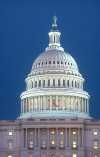A Guide to the International Leadership of the 108th Congress of the United States March 2003

Congressional activities are key to the understanding of American foreign policy. The role of the Senate in ratifying treaties (with a 2/3 majority) is widely known; less known abroad is the fact that this body must also confirm, by a simple majority, all high-ranking civilian and military posts including all Ambassadors and State Department officials in Washington responsible for executing the President's foreign policy. The role of the House of Representatives is also often under-estimated in works published in France. Military and foreign policy operations must be financed individually and the House of Representatives has the final say on these matters. It is even less well-known that Senators and Congressmen who hold important positions in the majority party of one of the houses or who chair committees can unilaterally block a nomination or the financing of a particular project. In fact, nothing other than peer pressure can force a Congressional leader to vote against his or her will. A committee chair determined to oppose a bill possesses almost absolute power to block its passage. Therefore, the personality of principal members, their political history, and their relationships with colleagues play a uniquely important role in the US Congress.
Since the 2000 election of the 107th Congress, Ifri publishes a guide designed to enlighten the French and European public, describing precisely and clearly the principal leaders in international affairs in the United States Congress. This guide also outlines their powers. It also includes Congressional leaders who are not necessarily specialists in international relations, but who exert such strong political influence that it is impossible to ignore their role and their potential influence on foreign policy. Since the 108th Congress, Ifri has benefited from the services of one of the most prominent experts on the role of Congress in foreign policy, James M. Lindsay. At the time a Senior Fellow at the Brookings Institution, he is currently Vice-President and Research Director at the Council on Foreign Relations in New York. The current edition is particularly complete and includes appendices not included in previous versions such as an extensive bibliography and an overview of the French Caucus (created in Congress at the end of 2003). Important staff members are also identified, with their complete contact information, thus facilitating communication and making this document into not only a useful reference, but also a working document. It will be of interest to all those in the public and private sectors, as well as academics and researchers, needing precise information on decision-making in the United States.


